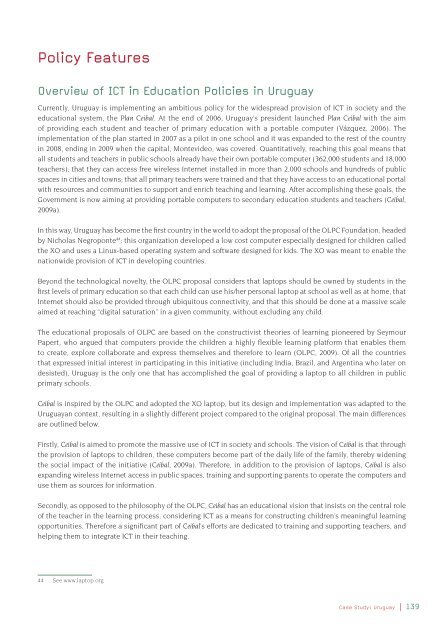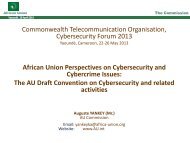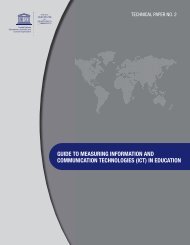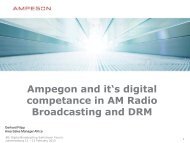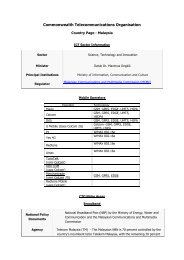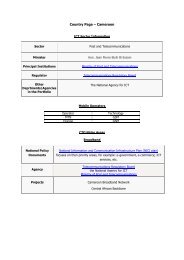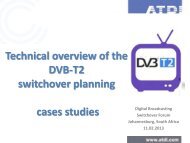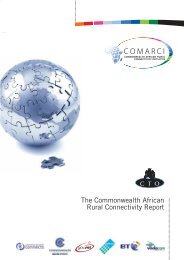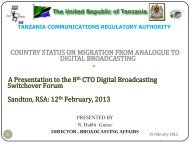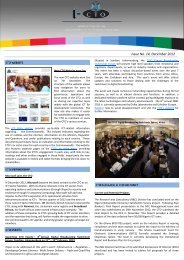Transforming education: the power of ICT policies - Commonwealth ...
Transforming education: the power of ICT policies - Commonwealth ...
Transforming education: the power of ICT policies - Commonwealth ...
Create successful ePaper yourself
Turn your PDF publications into a flip-book with our unique Google optimized e-Paper software.
Policy Features<br />
Overview <strong>of</strong> <strong>ICT</strong> in Education Policies in Uruguay<br />
Currently, Uruguay is implementing an ambitious policy for <strong>the</strong> widespread provision <strong>of</strong> <strong>ICT</strong> in society and <strong>the</strong><br />
<strong>education</strong>al system, <strong>the</strong> Plan Ceibal. At <strong>the</strong> end <strong>of</strong> 2006, Uruguay’s president launched Plan Ceibal with <strong>the</strong> aim<br />
<strong>of</strong> providing each student and teacher <strong>of</strong> primary <strong>education</strong> with a portable computer (Vázquez, 2006). The<br />
implementation <strong>of</strong> <strong>the</strong> plan started in 2007 as a pilot in one school and it was expanded to <strong>the</strong> rest <strong>of</strong> <strong>the</strong> country<br />
in 2008, ending in 2009 when <strong>the</strong> capital, Montevideo, was covered. Quantitatively, reaching this goal means that<br />
all students and teachers in public schools already have <strong>the</strong>ir own portable computer (362,000 students and 18,000<br />
teachers); that <strong>the</strong>y can access free wireless Internet installed in more than 2,000 schools and hundreds <strong>of</strong> public<br />
spaces in cities and towns; that all primary teachers were trained and that <strong>the</strong>y have access to an <strong>education</strong>al portal<br />
with resources and communities to support and enrich teaching and learning. After accomplishing <strong>the</strong>se goals, <strong>the</strong><br />
Government is now aiming at providing portable computers to secondary <strong>education</strong> students and teachers (Ceibal,<br />
2009a).<br />
In this way, Uruguay has become <strong>the</strong> fi rst country in <strong>the</strong> world to adopt <strong>the</strong> proposal <strong>of</strong> <strong>the</strong> OLPC Foundation, headed<br />
by Nicholas Negroponte 44 : this organization developed a low cost computer especially designed for children called<br />
<strong>the</strong> XO and uses a Linux-based operating system and s<strong>of</strong>tware designed for kids. The XO was meant to enable <strong>the</strong><br />
nationwide provision <strong>of</strong> <strong>ICT</strong> in developing countries.<br />
Beyond <strong>the</strong> technological novelty, <strong>the</strong> OLPC proposal considers that laptops should be owned by students in <strong>the</strong><br />
fi rst levels <strong>of</strong> primary <strong>education</strong> so that each child can use his/her personal laptop at school as well as at home, that<br />
Internet should also be provided through ubiquitous connectivity, and that this should be done at a massive scale<br />
aimed at reaching “digital saturation” in a given community, without excluding any child.<br />
The <strong>education</strong>al proposals <strong>of</strong> OLPC are based on <strong>the</strong> constructivist <strong>the</strong>ories <strong>of</strong> learning pioneered by Seymour<br />
Papert, who argued that computers provide <strong>the</strong> children a highly fl exible learning platform that enables <strong>the</strong>m<br />
to create, explore collaborate and express <strong>the</strong>mselves and <strong>the</strong>refore to learn (OLPC, 2009). Of all <strong>the</strong> countries<br />
that expressed initial interest in participating in this initiative (including India, Brazil, and Argentina who later on<br />
desisted), Uruguay is <strong>the</strong> only one that has accomplished <strong>the</strong> goal <strong>of</strong> providing a laptop to all children in public<br />
primary schools.<br />
Ceibal is inspired by <strong>the</strong> OLPC and adopted <strong>the</strong> XO laptop, but its design and implementation was adapted to <strong>the</strong><br />
Uruguayan context, resulting in a slightly different project compared to <strong>the</strong> original proposal. The main differences<br />
are outlined below.<br />
Firstly, Ceibal is aimed to promote <strong>the</strong> massive use <strong>of</strong> <strong>ICT</strong> in society and schools. The vision <strong>of</strong> Ceibal is that through<br />
<strong>the</strong> provision <strong>of</strong> laptops to children, <strong>the</strong>se computers become part <strong>of</strong> <strong>the</strong> daily life <strong>of</strong> <strong>the</strong> family, <strong>the</strong>reby widening<br />
<strong>the</strong> social impact <strong>of</strong> <strong>the</strong> initiative (Ceibal, 2009a). Therefore, in addition to <strong>the</strong> provision <strong>of</strong> laptops, Ceibal is also<br />
expanding wireless Internet access in public spaces, training and supporting parents to operate <strong>the</strong> computers and<br />
use <strong>the</strong>m as sources for information.<br />
Secondly, as opposed to <strong>the</strong> philosophy <strong>of</strong> <strong>the</strong> OLPC, Ceibal has an <strong>education</strong>al vision that insists on <strong>the</strong> central role<br />
<strong>of</strong> <strong>the</strong> teacher in <strong>the</strong> learning process, considering <strong>ICT</strong> as a means for constructing children’s meaningful learning<br />
opportunities. Therefore a signifi cant part <strong>of</strong> Ceibal’s efforts are dedicated to training and supporting teachers, and<br />
helping <strong>the</strong>m to integrate <strong>ICT</strong> in <strong>the</strong>ir teaching.<br />
44 See www.laptop.org<br />
Case Study: Uruguay | 139


